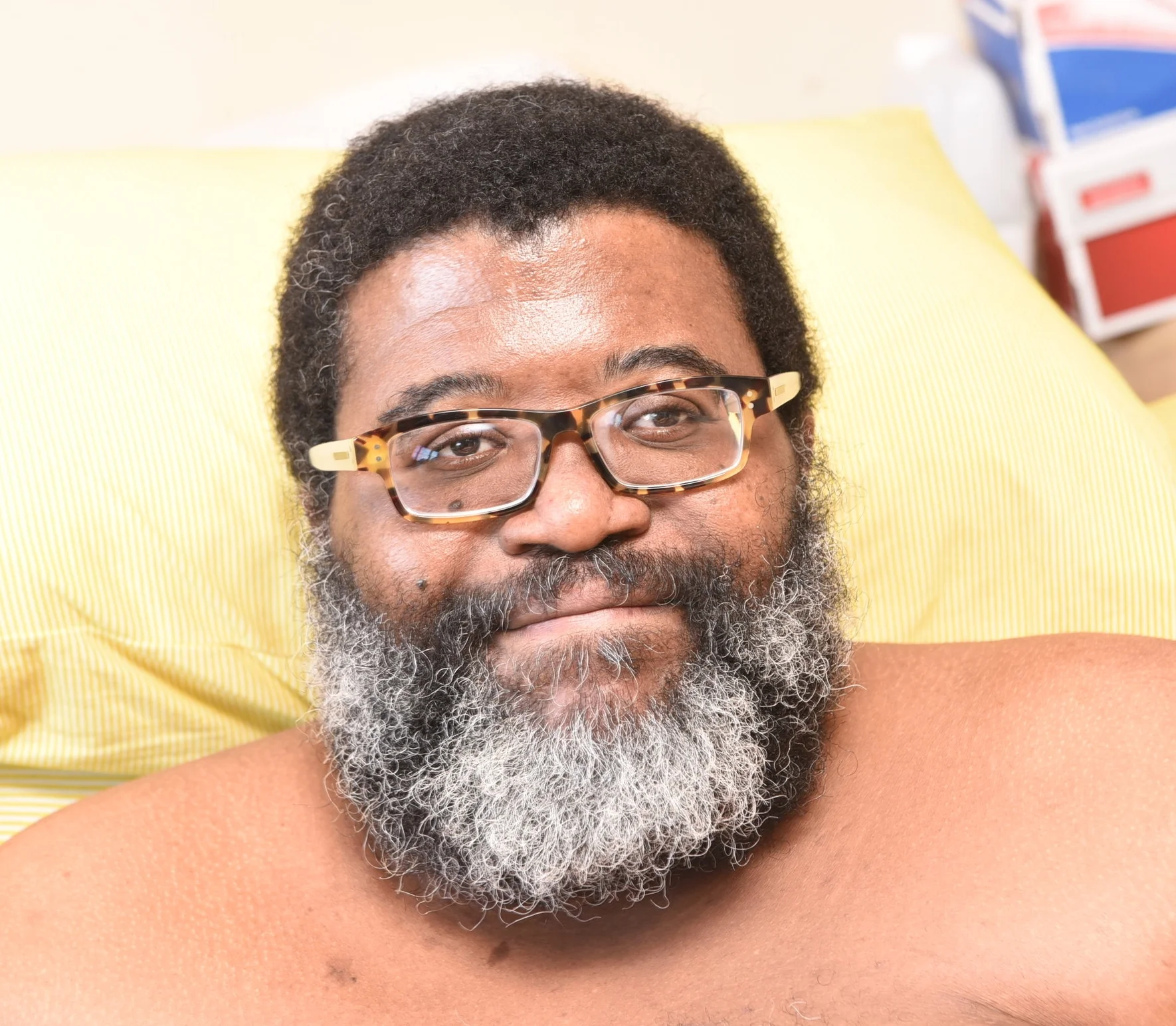Quadriplegic faces eviction from assisted living home
July 19, 2018
It took five years before Rohan Salmon was finally able to open up and meet the friend who fell asleep at the steering wheel of a rented vehicle involved in a devastating accident 16 years ago that left him paralyzed from the chest down.
At Sunrise Senior Living in Richmond Hill which has been Salmon’s home since November 18, 2003, the two men engaged in conversation in the facility’s garden and in the activity room over a chicken meal he ordered from a nearby restaurant.
At the end of the meeting, the quadriplegic accompanied his friend to the parking lot and presented him with a gift before he left.
For Salmon, the parting was gut-wrenching.
“As he drove off, it hit me how my life had changed forever,” said Salmon, fighting back tears. “So often, I would sit in a vehicle with him and we would be driving somewhere together. That would no longer happen. The weight of everything finally got to me and I cried like a baby.”
On the afternoon of October 27, 2002, the then English as a Second Language (ESL) contract teacher and two of his students were on their way to Muskoka to see the fall leaves change colour when their vehicle overturned and rolled four times on Highway 11 south of Bracebridge.
A Korean student in the backseat died a few hours later at Sunnybrook Health Science Centre where he and Salmon had been airlifted, while the driver – a friend and Japanese international student who the teacher was helping prepare to enter George Brown College – suffered minor injuries and was discharged from hospital a few hours after the accident.
That was expected to be his last weekend trip with students.
“It was their idea to go,” said Salmon who was in a coma for several days. “I didn’t want to make the trip because I was dating, and my partner felt that we should be sharing more time together on weekends. I promised her that this would be my last time doing this.”
Arranging that meeting several years ago took time as Salmon wanted to be in the right frame of mind to genuinely forgive his friend.
“I couldn’t hold what happened ever against him because he has suffered immensely,” he said. “From everything I heard, this young man is carrying a tremendous and crushing guilt and sorrow. I wanted so badly to forgive him from my heart with no residual feelings. I wanted to move forward in this friendship. Yes, it’s true that I am not going to forget.”
Reconciliation, Salmon thought, was the end of that chapter and he could live out the rest of his life at peace with himself.
He was so wrong.
The management at Sunrise Senior Living claims that they sent Salmon a letter in 2014 informing him of a rent increase. He said he never got it.
After the tragic accident, Salmon was awarded a monthly insurance annuity to cover his living costs with a two per cent annual inflation increase. The facility provided an hour of basic care daily and he paid for a personal support worker and other private staff.
At the time the facility claims it informed him of the rent increase, he was paying $5,475 a month in a 31-day cycle and $5,250 over 30 days.
“That was what I was paying until this new executive director came on board in 2015 and was very belligerent,” said Salmon. “She was discriminating and targeted me. When I signed this deal in 2003 with Sunrise, it was good for them as they had just opened and were looking for clients. As time went by and I didn’t die in the three to five years as most elderly residents, they realized it was a bad deal and they wanted to stick it to me. I have outlived anything they could have imagined, and they figured they have got to find a way to get me out.”
With the relationship with the executive director deteriorating, Salmon – the only Black resident most of the time – escalated the case to Sunrise’s head office in Virginia. He contacted Martin Brown who is the manager of resident relations.
“I thought he was going to be a champion and advocate for me,” said Salmon who migrated from Jamaica in 1977 and attended Carleton University and the University of Ottawa. “However, I quickly realized I was getting nowhere with him and he was going to toe the party line.”
In early 2017, Salmon was hospitalized with four abscesses in his stomach, one of which was ruptured.
He says that as he was about to leave Toronto General Hospital, the executive director and two other staff members showed up to inform him that he wouldn’t be allowed to return to Sunrise if he wasn’t willing to pay $12,000 monthly.
“When they said, ‘you will not be able to come back home’, I asked ‘why’ and broke down in tears,” he said. “They then said I would need extra treatment and nurses because of the abscesses. When the physician who attended me heard that, he concluded it was a lot of hogwash.
“…It’s unconscionable that Sunrise is pursuing me as they have in the last three years. They have tried to bump up my level of care to get more money out of me. I have been independently assessed and when they couldn’t get me on a time factor, they told me they implemented a new points system for things I need and use.”
A few days later, the monthly rent was lowered to $10,255 as ‘a gesture of goodwill’. That was almost double what he was paying.
“I have an annuity and a couple of bonds, but I just can’t come up with that kind of money,” Salmon said. “I have structured things in such a way that I am able to pay my rent, bills and attendants and still have a little money left over for anything else I may need.”
He claims that expensive equipment that he had in his room was removed when he spent nearly seven months in hospital for a bowel obstruction in 2012.
Salmon, who paid his rent during the time he was away, estimates his deluxe rehab arm bike, custom-fitted bariatric wheelchair and custom-powered chair were worth close to $65,000. He says Sunrise’s lawyer said the corporation would give him $3,500 for the equipment as ‘their show of good faith’.
“I was led to believe that it was in storage at Sunrise’s Aurora location all this time,” he said. “They told me they were safe and would be returned whenever I wanted them. Now here I was on May 8 learning through an email that my equipment was gone and being told to take this money on condition that I never talk about the equipment again. I was also informed it was a one-time offer and if I accepted it, I would also have to move out by May 31.”
Salmon refused the offer and, in July 2017, received a notice from the Landlord and Tenants Board (LTB) stating that he would be evicted if he didn’t settle a $14,700 outstanding payment. With his back against the wall, he turned to good friend Wes Hall who he met in church 27 years ago. They share the same faith.
An influential Bay St. power broker and owner of a world-class luxury hotel in St. Lucia, Jamaican-born Hall enlisted a high-powered lawyer to defend Salmon who started teaching in 1994.
“Wes has lifted me in so many ways over the years,” he said. “I was reluctant to reach out to him, but he insisted and brought in a powerful lawyer from Norton Rose Fulbright.”
As part of a negotiation, Salmon learned last November 30 that he would have six to seven months to find a new retirement home if he didn’t pay the arrears. In the meantime, his rent was bumped up to the market price, meaning he would have to fork out $6,291 monthly which is an increase of nearly $800 for a room with stained walls and dirty carpet that hasn’t been changed since he moved in.
The LTB order also required Sunrise to ‘undertake good faith efforts to assist the tenant in identifying adequate alternative housing’.
When Salmon submitted his rent cheque around May 29 this year, he received a letter from the business manager a few days later indicating it wouldn’t be cashed and a sheriff would be summoned to remove him.
“I was frozen in fear,” he said. “I was left with no choice but to reach out to anyone who could assist me and that included the media. For the longest time, I have been carrying this burden and questioning myself. I thought I was reckless and neglectful and had not paid attention to the notice of increase that Sunrise claimed they delivered in my mailbox. I know I didn’t get it. I have hope now.”
Salmon’s mother, Fay Wheeler, who worked in factories to provide for her children, along with Hall – the executive chairman and founder of Kingsdale Advisors – and other close relatives and friends are part of his circle of support.
“We roomed together, and he is a fun-loving guy and someone who is easy to like,” said Hall, who started a GoFundMe webpage for his friend. “In the early days after the accident, he used to come to my place in his wheelchair and play basketball with my kids. Over the years, he became a recluse and shut everyone out while being confined to his room which is his sanctuary. Every year, to this day, he remembers my wife and my wedding anniversary and plans a great meal for us at a restaurant. Sometimes he would plan for us to meet with long-time friends sharing the same anniversary dates. It’s like he wants us to be happy and celebrate even though he can’t be with us.”
Toronto District School Board principal Ainsworth Morgan and Salmon have been friends for nearly four decades.
“We grew up in Regent Park and Rohan was a high achiever, gifted athlete and a fighter,” Morgan said. “He never liked losing and that competitive spirit drew us together. His current situation saddens me, but I am so thankful that he still has that competitive edge.”
Salmon is on the March of Dimes Canada non-profit housing waiting list. They provide apartments for people with disabilities.






